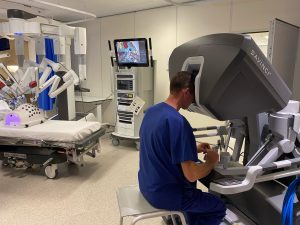Researchers at the Royal Adelaide Hospital (RAH) are using artificial intelligence (AI) to identify which patients should and should not receive certain antibiotics.
AI tools may help clinicians to accurately and quickly re-classify patients who mistakenly avoid the most effective antibiotics for them.
Not all allergies are true allergies
Penicillin antibiotics are the primary treatment to fight many infections in hospital.
However, around 10 per cent of patients have a penicillin allergy label on their medical record, which means that doctors must prescribe a different antibiotic that may be more costly and less effective.
The problem is that most of these patients are not actually allergic and could receive penicillin. Some may be penicillin intolerant rather than allergic, which means that they might have had side-effects such as nausea in the past, but it is still safe and recommended to have a penicillin antibiotic.
Previous research by the team has shown that patients receive different medications based on having an allergy or intolerance label, so a labelling error means that patients could needlessly miss out on the most suitable treatment for them.
“Having an incorrect penicillin allergy label can delay the administration of the right antibiotic to patients, which can be crucial when treating life-threatening infections such as sepsis. It can also result in an increased risk of infection with resistant bacterial strains, an unnecessarily delayed recovery, and prolonged stays in hospital.” said Dr Melinda Jiang, Resident Medical Officer at the RAH.
Drug allergies trigger an abnormal response from the body’s immune system. They can be mild, like a rash, but in rare cases very serious, causing anaphylactic shock. If a patient is truly allergic to penicillin, they must not receive penicillin antibiotics.
Drug intolerances are side effects (e.g. nausea, abdominal pain). These may cause some discomfort but are not dangerous. If required, the drug can still be given safely, particularly if the side effects are mild or can be successfully managed (e.g. with pain relief).
How AI can help
Systematically reviewing all allergy labels to improve their accuracy would help patients and hospitals.
The team have demonstrated that AI can be successfully used to review penicillin allergy labels and predict whether it is a true allergy, or instead an intolerance. One of the three CEO Clinical Rapid Implementation Project Scheme grants has been awarded to the team, which will support them with this project.
“Our research involves the world-first use of machine learning algorithms to identify RAH inpatients suitable for penicillin allergy evaluation. This is much more efficient than manually looking for every recorded penicillin allergy in the hospital.
“Once identified, the Immunology team can assess these patients, and if it is safe to do so, we can test their reaction. If it is not a true allergic reaction, the ‘allergy’ label can be safely removed.” said Dr Jiang.
Dr Jiang believes the impact of this success could be massive for patients.
“If we can use AI to help us improve the accuracy of penicillin allergy labels, we can give the right antibiotics to the right patients.
This will reduce complications and bacterial resistance, allow people to recover from infections faster and get home soon.”
Read the research
Click here to reach the research on how AI can be used to de-label penicillin allergies.
Click here to read about how penicillin reaction labels affect prescribing practices.



